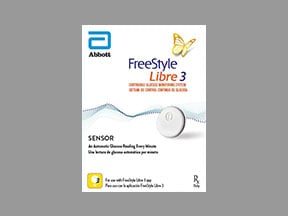
Freestyle Libre 3 Sensor Coupons & Savings Card – Discount Prices from $151.31
My prescription
Edit
1, Freestyle Libre 3 Sensor (2 Miscellaneous)
Select pharmacy

CVS
$178.04
COUPON PRICE
Walmart
$151.31
COUPON PRICE
Walgreens
$153.04
COUPON PRICE
Albertsons
$159.70
COUPON PRICEFreestyle Libre 3 Sensor savings card
Show this card to your pharmacist
Walmart
$151.31
BIN
ID
PCN
GRP
019876
LH4051F716
CHIPPO
LHX
Powered by
Price history for Freestyle Libre 3 Sensor
2 Miscellaneous, 1nan
Average retail price for Freestyle Libre 3 Sensor
Average SaveHealth price for Freestyle Libre 3 Sensor
Our price history data is based on aggregated prescription data collected from participating pharmacies in America. Our prescription data updates daily to reflect the latest price changes. If you notice a missing data point, it means there wasn't sufficient data available to generate a monetary value for that date.
*Retail prices are based on pharmacy claims data, and may not be accurate when we don't have enough claims.
Freestyle Libre 3 Sensor dosage forms
Dosage Quantity Price from Per unit 1nan 2 Miscellaneouses $151.31 $75.66 1nan 1 Miscellaneous $75.65 $75.65
| Dosage | Quantity | Price from | Per unit |
|---|---|---|---|
| 1nan | 2 Miscellaneouses | $151.31 | $75.66 |
| 1nan | 1 Miscellaneous | $75.65 | $75.65 |
How much does Libre 3 cost per month?
The cost of the Libre 3 system can vary depending on factors such as location, insurance coverage, and pharmacy pricing. Without insurance, the monthly cost can range from approximately $100 to $200. It is advisable for individuals to check with their insurance provider and local pharmacies for the most accurate pricing information.
How can I get free Libre 3 sensors?
Obtaining free Libre 3 sensors typically involves checking with healthcare providers, insurance plans, or patient assistance programs. Some options include:1. Insurance Coverage: Verify if the insurance plan covers Libre 3 sensors and what the copay might be.2. Manufacturer Programs: Abbott, the manufacturer, may offer patient assistance programs or discounts. It's advisable to visit their official website or contact them directly for more information.3. Healthcare Provider: Discuss with a healthcare provider, as they might have samples or know of programs that offer free sensors.4. Promotional Offers: Occasionally, there might be promotional offers for new users, which can be found on the manufacturer's website or through healthcare providers.5. Community Health Clinics: Some clinics may have resources or programs to assist patients in obtaining necessary medical supplies.It's important to explore these options and communicate with relevant parties to determine eligibility and availability.
Can I buy FreeStyle Libre 3 over the counter?
The FreeStyle Libre 3 system typically requires a prescription from a healthcare provider. It is not usually available for purchase over the counter. It is advisable to consult with a healthcare professional to obtain a prescription and discuss whether this continuous glucose monitoring system is suitable for the individual's needs.
Does the Libre 3 leave a needle in your arm?
The Libre 3 sensor does not leave a needle in the arm. It uses a small, flexible filament that is inserted just under the skin to measure glucose levels. The insertion process involves a needle, but the needle is removed after the sensor is applied, leaving only the filament in place.
How many Libre 3 sensors come in a box?
A box of Libre 3 sensors typically contains one sensor.
